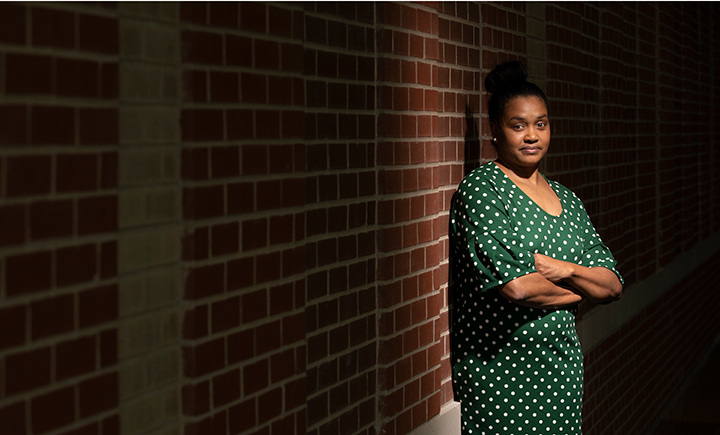Binghamton researcher explores impact of racial microaggressions on campus

Miesha Marzell loves being a scientist, a researcher and an educator. She has several lines of research with a single overarching goal: Prevent substance abuse in communities and youth of color.
“I’ve always been interested in health and well-being,” said the assistant professor of social work and public health. “I’ve always wanted to help individuals who might be marginalized or who don’t have a voice.”
For the past few years Marzell has been exploring how racial microaggressions impact the mental health and behavior — specifically high-risk behavior associated with substance use — of students of color in college. Racial microaggressions are comments or actions (often unintentional) that express a prejudiced attitude based on race. Students of color may experience racial microaggressions inside or outside the classroom, as well as among peers.
Regardless of their mode of delivery or who is perpetrating the microaggressions, the bottom line, according to Marzell, is that they build up and can impact a student’s overall health and well-being.
In a study that looked at marijuana use in college students of color who experienced racial microaggressions, Marzell found that students often turned to marijuana because they didn’t feel socially accepted. The students identified their desire to fit in as the motivation for using marijuana.
“If I’m experiencing microaggressions and the climate I’m in doesn’t feel inclusive, I use more marijuana than those who don’t experience microaggressions because I want to feel better socially,” she explained.
This puts students of color at a disadvantage.
“Any substance use isn’t a healthy decision when you think about brain functioning and development for students in this age group, and students often struggle with high levels of stress and issues of mental health,” Marzell said. “Plus, marijuana use isn’t legal for recreational use [in New York state].”
The study also showed slightly higher marijuana use among Black students than the general population. Marzell and her graduate students intend to dig deeper into the students’ marijuana use once they can resume their work following the pandemic.
Ultimately, Marzell wants to understand substance use from a harm-reduction standpoint to reduce students’ high-risk behaviors and the negative consequences associated with them. Her goal is to provide information that could be used across college campuses to improve health promotion and prevention services for students of color.
“If I’m a college [drug and alcohol] prevention coordinator trying to reduce marijuana use, it would be good to know that some students of color might be using marijuana so they can fit in, so we could find other ways for them to feel included socially,” Marzell explained. “This takes away their motivation to participate in the high-risk behavior.”
Marzell said it is also imperative to work with college administrators and diversity offices to change the campus environment so students of color feel they are part of the college community.
“We need to determine how to make the environment more inclusive and welcoming,” she said. “We need to find our way to be more equitable to everybody.”
Marzell understands these are enormous challenges for Binghamton University and college campuses nationwide.
“It’s messy, but if we don’t get in there and do the work, then how are we ever going to make changes?” she said.
Yet, she is hopeful.
“Yes, we’re going to stumble, we’re going to make mistakes, but we are having these uncomfortable conversations about race and discrimination on our campus and that is moving us forward,” Marzell said. “Even if we don’t always see eye to eye or take different approaches, being a part of those conversations is important because the kinds of changes we’re trying to make are complex.”
A commitment to education and mentoring
Marzell is a first-generation college student whose grandfather and parents instilled in her the recognition that through education she could make a difference. But when she got to college, Marzell received little academic guidance, nor did she have many faculty members who looked like her or shared the same lived experiences.
“That’s one of the reasons I love working with students of color,” she said. “I am a Black woman educator and researcher and I want to teach students of color how to conduct research. I want to give back and help Black communities in any way I can.”
Just as her family predicted, education is Marzell’s method for effecting change.
“As faculty members we have this extraordinary opportunity to not just help the communities we serve, but also to help educate the people who are going to go out and transform communities, making them safer and healthier,” she said. “It’s what really gets me excited about the work I do.”
